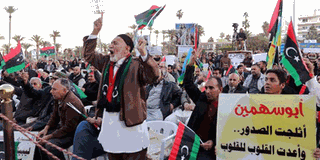Breaking News: At least 10 feared to have drowned in Makueni river
Libyan unity government formed, UN urges support

Libyan protesters take part in a demonstration against a UN-sponsored agreement on forming a national unity government and in support of the Libyan-Libyan dialogue, at the Martyrs' Square in the capital Tripoli, on January 8, 2016. Libya’s UN-brokered national unity government announced its formation on Tuesday under a disputed deal aimed at ending years of bloodshed. PHOTO | MAHMUD TURKIA |
What you need to know:
- The United Nations called on the country’s lawmakers to endorse the new administration, after less than half of members of parliament signed up to the agreement.
- The unity government, headed by businessman Fayez al-Sarraj, comprises 32 ministers, the administration announced on its Facebook page.
- The country has two rival parliaments and administrations - in the militia-held capital and in eastern Libya - as well as the new unity government.
TRIPOLI, Tuesday
Libya’s UN-brokered national unity government announced its formation on Tuesday under a disputed deal aimed at ending years of bloodshed.
The United Nations called on the country’s lawmakers to endorse the new administration, after less than half of members of parliament signed up to the agreement.
The unity government, headed by businessman Fayez al-Sarraj, comprises 32 ministers, the administration announced on its Facebook page.
“I congratulate Libyan people and the Presidency Council on the formation of Government of National Accord,” UN envoy Martin Kobler wrote on Twitter.
YEARS OF CHAOS
Libya has been in chaos since the 2011 ouster of long-time dictator Muammar Gaddafi.
The country has two rival parliaments and administrations - in the militia-held capital and in eastern Libya - as well as the new unity government.
On December 17, under UN guidance, around 80 of 188 lawmakers from Libya’s internationally recognised parliament and 50 of 136 members of the Tripoli-based General National Congress signed the deal.
World powers are pressing all sides in the conflict to accept the power-sharing deal, which has been given added urgency by fears that jihadists in Libya are building a new stronghold on Europe’s doorstep.





